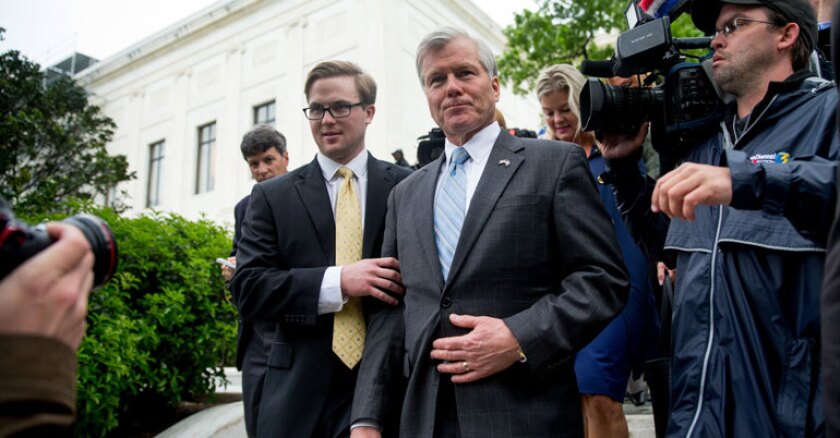In a unanimous decision, the court threw out the corruption case against former Virginia Gov. Robert McDonnell, who had accepted more than $175,000 in gifts and loans from Johnnie R. Williams Jr., the CEO of a dietary supplement company looking to do business with the commonwealth of Virginia. Although McDonnell made calls and set up meetings for him, the court ruled that these did not constitute "official acts" under federal statute and that the prosecution's interpretation of bribery law was "boundless."
Where the jury in McDonnell's trial saw a clear black-and-white distinction between normal constituent service and the governor's actions, the court seemed only to see areas of gray. That seems to suggest that prosecutors and investigators will now have a much harder time mounting a corruption case against a politician.
"The Supreme Court decision really gives a green light to elected officials to solicit whatever goodies they may wish, as long as they're not clear about doing anything in return," said Stephen Farnsworth, a political scientist at the University of Mary Washington in Virginia.
In defense of the ruling, Chief Justice John Roberts wrote: "The government's expansive interpretation of 'official act' would raise significant constitutional concerns. Conscientious public officials arrange meetings for constituents, contact other officials on their behalf and include them in events all the time."
By this logic, making calls on behalf of a constituent is not a crime, the justices concluded, even if that constituent has just handed you a gold watch. You actually have to follow through and deliver the goods.
Some legal experts thought the ruling was sensible and correct because prosecutors had failed to prove he had done favors for a wealthy donor that he might not have done for any constituent.
"I don't see this as especially novel," said James Alt, a Harvard University expert on public corruption. "For the last 25 years, the courts have typically looked for something approximating an explicit quid pro quo, rather than creating a general appearance of corruption, to secure a conviction."
The court, however, did not throw out bribery statutes themselves. Rather, it said that the jury had not been properly instructed about what constitutes an official act. Corruption cases could still be brought. In fact, the court said that McDonnell could be retried on fresh charges.
"When, in the future, prosecutors agree to these instructions, juries might well have no problem convicting in similar cases," said Daniel Richman, a former federal prosecutor who teaches law at Columbia University.
But public corruption cases are always hard to make because it can be difficult to tease out the difference between the normal trading of favors that is the main currency in politics and the attempt to make something happen in exchange for personal gain.
The Supreme Court has actually opened the door for public officials to charge businesspeople and the like for access to political-natured meetings, said Randall Eliason, a former federal prosecutor who teaches at George Washington University. He outlined a scenario, which he said would now be legal, in which a governor could accept money in exchange for arranging a business owner to meet with public officials, specifically stipulating that they won't influence the outcome.
What's more, some critics of the decision worry that in its wake, it could be difficult to ever prosecute an official if nothing is recorded or written down.
"The few politicians whom prosecutors may be able to convict are those who are careless enough to put together corruption to-do lists, since, according to Roberts, a test of whether something is a bribable official act is whether it is 'the kind of thing that can be put on an agenda, tracked for progress and then checked off as complete,'" wrote Amy Davidson in the New Yorker.
Prosecutors will almost have to have a bug in the room, said Farnsworth, capturing on tape a public official explicitly stating his desire to shift a policy or award a contract on behalf of a benefactor. Farnsworth called this the "Blagojevich rule," after Rod Blagojevich, the governor of Illinois who was caught on tape musing about the money he could make selling the "golden" U.S. Senate seat vacated by Barack Obama. In March, the Supreme Court refused to hear Blagojevich's appeal of his 2011 conviction.
The McDonnell case was pursued by federal rather than state prosecutors because Virginia law was insufficiently clear about prohibiting gifts from individuals or companies with business before the state. In response to the McDonnell case, Virginia has made the rules more explicit, but there are still plenty of exemptions.
Lack of clarity in federal and state corruption laws are a great boon to defense teams, said Farnsworth.
"The public's idea of how public officials should behave is very different from what the law allows," he said. "When this case was before a jury, McDonnell lost on count after count, and it didn't take the jury long to declare McDonnell's behavior criminal."









